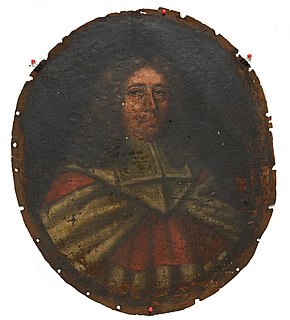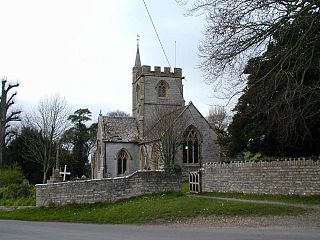John Forster was an Irish lawyer, politician and judge.
The County Palatine of Tipperary Act 1715 is an Act of the Parliament of Ireland. This Act enabled the purchase by the crown of the Palatine Rights in County Tipperary given to the Earls of Ormond, later Dukes of Ormonde, over the preceding centuries. Prior to the Act, the dukes appointed the sheriffs and judges of the county and owned certain revenues from the county which would otherwise have gone to the Crown.

Sir Richard Cox, 1st Baronet PC was an Irish lawyer and judge. He served as Chief Justice of the Common Pleas for Ireland from 1701 to 1703, Lord Chancellor of Ireland from 1703 to 1707 and as Lord Chief Justice of the Queen's Bench for Ireland from 1711 to 1714.
Sir Richard Bolton was an English lawyer and judge, who was an important figure in Irish political life in the 1630s and 1640s.
Sir James Donnellan was an Irish lawyer and politician, who became Chief Justice of the Irish Common Pleas in 1660. He was unusual among the Irish judges of the time in being of Gaelic descent; and more remarkable in that his service as a judge under Oliver Cromwell did not disqualify him from service after the Restoration of Charles II.
Sir Richard Levinge, 1st Baronet was an Irish politician and judge, who played a leading part in Irish public life for more than 30 years.
Thomas Marlay (c.1680–1756) was an Irish politician and judge, who ended his career as Lord Chief Justice of Ireland. He is remembered chiefly for beginning the rebuilding of Celbridge Abbey, and as the grandfather of the statesman Henry Grattan.

The chief justice of the Common Pleas for Ireland was the presiding judge of the Court of Common Pleas in Ireland, which was known in its early years as the Court of Common Bench, or simply as "the Bench". It was one of the senior courts of common law in Ireland, and was a mirror of the Court of Common Pleas in England. The Court of Common Pleas was one of the "four courts" which sat in the building in Dublin which is still known as the Four Courts, apart from a period in the fourteenth century when it relocated to Carlow, which was thought to be both more central and more secure for the rulers of Norman Ireland.
John Rogerson (1676–1741) was an Irish politician, lawyer, and judge who became Solicitor-General, Attorney-General for Ireland, and Lord Chief Justice of the King's Bench in Ireland.
Sir Maurice Eustace was an Irish landowner, politician, barrister and judge of the seventeenth century who spent the last years of his career as Lord Chancellor of Ireland. This was an office for which he felt himself to be entirely unfit, and in which he was universally agreed to be a failure.
Sir Robert Dillon of Riverston was an Irish lawyer, judge, and politician. He came from a family with a distinguished record of judicial service. He pursued a successful career as judge, which was, however, dogged by accusations of corruption and other serious wrongdoing, of which the worst was that he had falsely condemned Nicholas Nugent, another judge and rival, to death. Sir Robert Dillon, the subject of this article, must not be confused with an earlier Sir Robert Dillon of Newtown, his grand-uncle, who was also Chief Justice of the Irish Common Pleas.

Sir Richard Reynell, 1st Baronet ,was an English-born judge who had a distinguished career in Ireland and held office as Lord Chief Justice of the King's Bench in Ireland. He was the first of the Reynell baronets of Laleham.
Sir Edward Smith or Smythe (1602–1682) was an English-born politician, barrister and judge who held the offices of Chief Justice of the Irish Common Pleas and judge of the Irish Court of Claims.
Sir Robert Booth (1626–1681) was an English-born judge who had a highly successful career in Ireland, where he held the offices of Chief Justice of the Irish Common Pleas and Lord Chief Justice of the King's Bench in Ireland.
Sir Theobald (Toby) Butler (1650-1721) was a leading barrister and politician in late seventeenth-century Ireland, who held office as Solicitor General for Ireland. He is mainly remembered for framing the civil articles of the Treaty of Limerick, and for his eloquent but unsuccessful plea to the Irish House of Commons against the passing of the Popery Act of 1703, which allowed any Protestant son of a Roman Catholic landowner to prevent his Catholic brothers from inheriting the family property. He was a much loved "character" in Dublin, and his great popularity shielded him from the penalties that he might otherwise have suffered as a result of his religious beliefs. Only his few enemies attacked him for his willingness to come to an accommodation with the new regime in order to preserve his own property.
Richard Levinge was an Irish politician and landowner from County Kildare.
Richard Nutley (1670–1729) was an English-born barrister, politician and judge assigned to official duty in early eighteenth-century Ireland. Whilst having a fascinating legal and political career, he also enjoyed the friendship of Jonathan Swift.

Samuel Gorges (1635-1686) was an English-born barrister and judge in seventeenth-century Ireland. His career has been described as "short and tragic".
Robert Johnston, or Johnson was an English born politician and judge in seventeenth century Ireland.
Robert Dixon (1685-1732) was an Irish barrister, judge and politician who served very briefly as a justice of the Court of Common Pleas (Ireland).